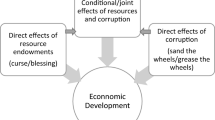Abstract
Natural resource wealth can be a curse or a blessing for a country. This paper hypothesises that the provision of productive public goods (or lack of it) is a pathway that helps understand these different outcomes when policy choices are made under the threat of conflict inherent in resource-rich countries. Facing potential conflict over resources, a self-interested ruler may choose to invest in either military repression or in productive public goods—physical and social infrastructure. While both measures aim at preventing conflict, we show theoretically that the optimal policy choice depends on the relative effectiveness of the ruler and the population in contesting the resources. Increased resource wealth provides a disincentive to invest in development if the ruler is more effective than the population in appropriating the resources. Conversely, if the ruler is relatively ineffective, more resource wealth induces higher levels of public goods. We present empirical evidence consistent with the predictions of the model for a sample of 57 countries over three decades. Thus, we provide and test empirically a conditional resource curse theory, postulating that the relative effectiveness of the contenders plays a crucial role in determining whether resources are a curse or a blessing.
Similar content being viewed by others
References
Acemoglu D, Robinson JA, Verdier T (2004) Kleptocracy and divide-and-rule: a model of personal rule. J Eur Econ Assoc 31: 162–192
Acemoglu D, Johnson S, Robinson JA (2003) An African success story: Botswana. In: Rodrik D (eds) Search of prosperity: analytical narrative on economic growth. Princeton University Press, Princeton
Azam JP (1995) How to pay for the peace? a theoretical framework with references to African countries. Public Choice 83: 173–184
Banks A (2001) Cross-national time-series data archive. Center for comparative political research, State University of New York, Binghamton
Bourguignon F, Verdier T (2000) Oligarchy, democracy, inequality and growth. J Dev Econ 62: 285–313
Bulte E, Damania R, Deacon R (2005) Resource intensity, institutions, and development. World Dev 33: 1029–1044
Calderon C, Serven L (2004) The effects of infrastructure development on growth and income distribution. Policy research working paper series, No. 3400, The World Bank
Callaghy TM (1984) The state-society struggle: Zaire in comparative perspective. Columbia University Press, New York
Canning D (1998) A database of world infrastructure stocks, 1950–1995. World bank policy research working paper, No. 1929
Caselli F (2006) Power struggles and the natural resource curse. Working paper
Cheibub J, Gandhi J (2004) A six-fold measure of democracies and dictatorships. Prepared for the annual meeting of the American political science association, Chicago, September 2004
Collier P, Hoeffler A (1998) On the economic causes of civil war. Oxf Econ Pap 50: 563–573
Collier P, Hoeffler A (2004) Greed and grievance in civil war. Oxf Econ Pap 56: 563–595
Deacon R, Saha S (2006) Public good provision by dictatorships: a survey. In: Ott AF, Cebula RJ (eds) The companion in public economics: empirical public economics. Edward Elgar Publishing, Cheltehham
Diehl P (2005) National material capabilities data documentation Version 3.0, Correlates of War Project
Dunning T (2005) Resource dependence, economic performance, and political stability. J Conflict Resolut 49: 451–482
Fearon JD, Laitin D (2003) Ethnicity, insurgency, and civil war. Am Polit Sci Rev 97: 75–90
Grossman H (1994) Production, appropriation and land reform. Am Econ Rev 705–712
Hall RE, Jones CI (1999) Why do some countries produce so much more output per worker than others?. Q J Econ 114(1): 83–116
Herbst J (2004) Effectiveness African militaries and rebellion: the political economy of threat and combat. J Peace Res 41(3): 357–369
Hodler R (2006) The curse of natural resources in fractionalized countries. Euro Econ Rev 50(6): 1367–1386
Jones B, Olken B (2005) Do leaders matter? national leadership and growth since world war II. Q J Econ 120: 835–864
Lake DA, Baum MA (2001) The invisible hand of democracy: political control and the provision of public services. Comp Polit Stud 34(6): 587–621
McGuire MC, Olson M (1996) The economics of autocracy and majority rule: the invisible hand and the use of force. J Econ Lit 34(1): 72–96
Mehlum H, Moene K, Torvik R (2006) Institutions and the resource curse. Econ J 116: 1–20
Robinson JA (2001) When is a state predatory? Working Paper
Ross ML (2001) Does oil hinder democracy. World Polit 53: 325–361
Sala-i-Martin X, Subramanian A (2003) Addressing the natural resources curse: an illustration from Nigeria. NBER Working paper
Sachs JD, Warner AM (1997) Natural resource abundance and economic growth. NBER working papers 5398. National Bureau of Economic Research, Cambridge
Wacziarg R (2002) Review of easterly’s the elusive quest for growth. J Econ Lit XL 907–918
Wick K (2008) Conflict and production: an application to natural resources. B.E. J Econ Anal Policy 8(1)(Topics): Article 2
World Bank (2006a) Education statistics—EdStats
World Bank (2006b) World development indicators
Author information
Authors and Affiliations
Corresponding author
Additional information
We thank Erwin Bulte, Robert Dur, Wieland Mueller, Imran Rasul, Stergios Skaperdas, two anonymous referees, and participants at the Royal Economic Society conference at Warwick and the conference on “Causes and Consequences of Conflict” in Berlin for their helpful comments. The usual disclaimer applies.
Rights and permissions
About this article
Cite this article
Sarr, M., Wick, K. Resources, conflict and development choices: public good provision in resource rich economies. Econ Gov 11, 183–205 (2010). https://doi.org/10.1007/s10101-010-0075-x
Received:
Accepted:
Published:
Issue Date:
DOI: https://doi.org/10.1007/s10101-010-0075-x




